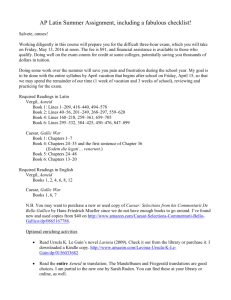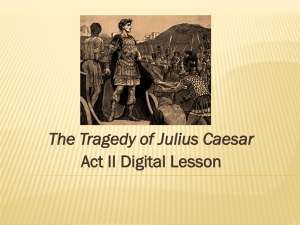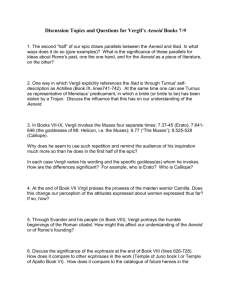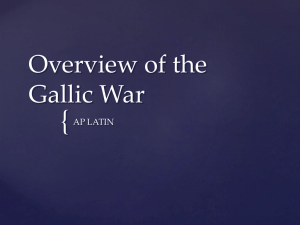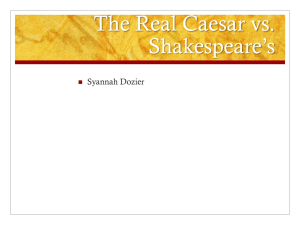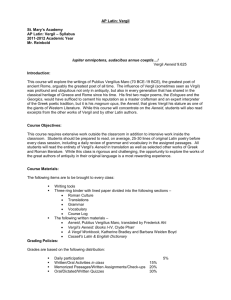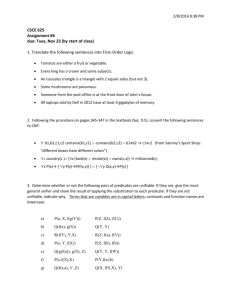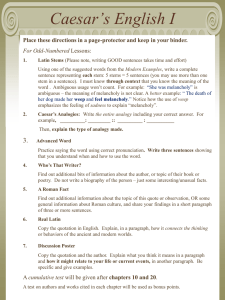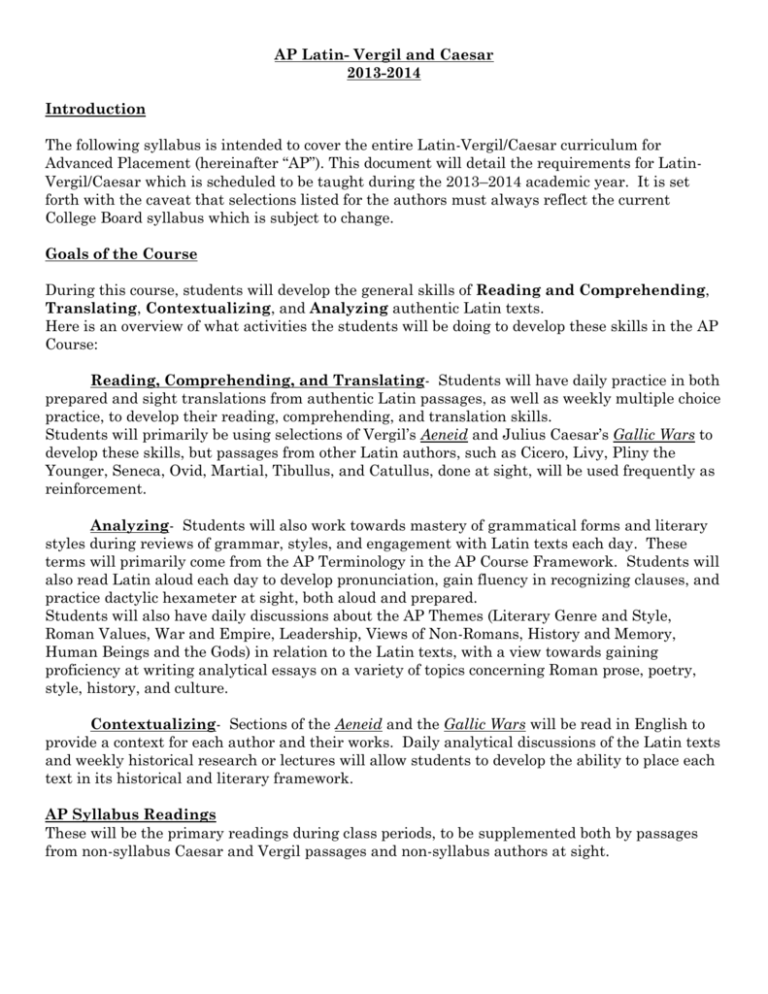
AP Latin- Vergil and Caesar
2013-2014
Introduction
The following syllabus is intended to cover the entire Latin-Vergil/Caesar curriculum for
Advanced Placement (hereinafter “AP”). This document will detail the requirements for LatinVergil/Caesar which is scheduled to be taught during the 2013–2014 academic year. It is set
forth with the caveat that selections listed for the authors must always reflect the current
College Board syllabus which is subject to change.
Goals of the Course
During this course, students will develop the general skills of Reading and Comprehending,
Translating, Contextualizing, and Analyzing authentic Latin texts.
Here is an overview of what activities the students will be doing to develop these skills in the AP
Course:
Reading, Comprehending, and Translating- Students will have daily practice in both
prepared and sight translations from authentic Latin passages, as well as weekly multiple choice
practice, to develop their reading, comprehending, and translation skills.
Students will primarily be using selections of Vergil’s Aeneid and Julius Caesar’s Gallic Wars to
develop these skills, but passages from other Latin authors, such as Cicero, Livy, Pliny the
Younger, Seneca, Ovid, Martial, Tibullus, and Catullus, done at sight, will be used frequently as
reinforcement.
Analyzing- Students will also work towards mastery of grammatical forms and literary
styles during reviews of grammar, styles, and engagement with Latin texts each day. These
terms will primarily come from the AP Terminology in the AP Course Framework. Students will
also read Latin aloud each day to develop pronunciation, gain fluency in recognizing clauses, and
practice dactylic hexameter at sight, both aloud and prepared.
Students will also have daily discussions about the AP Themes (Literary Genre and Style,
Roman Values, War and Empire, Leadership, Views of Non-Romans, History and Memory,
Human Beings and the Gods) in relation to the Latin texts, with a view towards gaining
proficiency at writing analytical essays on a variety of topics concerning Roman prose, poetry,
style, history, and culture.
Contextualizing- Sections of the Aeneid and the Gallic Wars will be read in English to
provide a context for each author and their works. Daily analytical discussions of the Latin texts
and weekly historical research or lectures will allow students to develop the ability to place each
text in its historical and literary framework.
AP Syllabus Readings
These will be the primary readings during class periods, to be supplemented both by passages
from non-syllabus Caesar and Vergil passages and non-syllabus authors at sight.
AP Syllabus for Vergil, Aeneid
Book 1: lines 1-209, 418-440, 494-578
Book 2: lines 40-56, 201-249, 268-297, 559-620
Book 4: lines 160-218, 259-361, 659-705
Book 6: lines 295-332, 384-425, 450-476, and 847-899
AP Syllabus for Caesar, Gallic War
Book 1:
Book 4:
Book 5:
Book 6:
Chapters 1-7
Chapters 24-35 and the first sentence of Chapter 36
Chapters 24-48
Chapters 13-20
Prerequisites and Summer Assignment
Successful completion of Latin IV and/or recommendation of teacher.
Students read the English sections of both Vergil’s Aeneid and Caesar’s Gallic Wars as stipulated
by the AP syllabus:
1. Vergil Aeneid Books 1, 2, 4, 6, 8, and 12
2. Caesar Gallic Wars Books 1, 6, and 7
Students are given the option of reading all of the Aeneid and Gallic Wars in English. They will
create, via a Word Document, comprehensive book summaries. These summaries will include
major events, characters, gods, goddesses, and geographic locations presented in each book for
the Aeneid and de Bello Gallico. Students will be given the new AP Themes prior to leaving
school the year before entering the AP course. These themes will be discussed for the purposes of
the summer assignment. They will keep a list of when content relating to the themes occurs in
the English readings.
During the year, students will reread the English passages of Vergil and Caesar as we read the
Latin selections. Content quizzes, student summaries, projects, and discussions will be used for
more detailed review.
Texts and Materials
We will be using the following textbooks in class:
LaFleur, Richard A. and McKay, Alexander G.; A Song of War: Readings from Vergil’s
Aeneid; Pearson Prentice Hall; New Jersey; July 2003.
Mueller, Hans-Friedrich. Caesar: Selections from De Bello Gallco. Bolchazy-Carducci
Publishers, 2012.
Perry, David J. A Call to Conquest: Readings from Caesar’s Gallic Wars. Pearson
Prentice Hall, 2012.
Weiden-Boyd, Barbara. Vergil’s Aeneid. Bolchazy-Carducci Publishers, 2012.
Williams, Rose and Debra L. Nousek. A Caesar Workbook. Bolchazy-Carducci
Publishers, 2012
Bradley, Katherine, and Barbara Weiden Boyd. A Vergil Workbook. BolchazyCarducci Publishers, 2nd ed., 2012
Recommended English translations for the Aeneid: Robert Fagles, Robert Fitzgerald,
Allen Mandelbaum, David West
Recommended English translation for De Bello Gallico: S.A. Handford, Caesar’s
Conquest of Gaul. NY: Viking Press (Penguin Books), 1951. C. Hammond, The Gallic
War: Seven Commentaries on The Gallic War with an Eighth Commentary by Aulus
Hirtius. Oxford University Press, 1999.
Students may feel free to purchase their own textbooks online from either Bolchazy-Carducci
publishers or Pearson textbook company.
Students may feel free to utilize online resources at home as well. Here is a list of recommended
websites:
1. For Latin lines of each author: www.thelatinlibrary.com
2. Caesar- Geoffrey Steadman, College Caesar http://geoffreysteadman.com/collegecaesar/
3. Dickinson College Caesar Wiki http://wiki.dickinson.edu/index.php/Caesar_Gallic_War
4. UPenn Vergil Site http://vergil.classics.upenn.edu/
5. Perseus Project- Caesar and Vergil www.perseus.tufts.eu
6. Alpheios site- add on to Firefox (vocabulary tool)
Some students have used www.nodictionaries.com in the past- however, their vocabulary is very
spotty and uneven in terms of correctness. Use with caution.
Students will use a 3-ring binder for blank Latin texts for translation. Highlighters may be used
for translation in class, as well for chunking grammar, but are optional.
Students will create and use an Interactive Notebook (see below).
Interactive Notebook- AP Terminology for Grammar/Literary Devices and AP Themes
Students will be required to keep a notebook, either on paper or in a Word document. The
notebook will be divided into the following sections:
a. AP Grammar/Literary Devices
b. AP Themes
Students will individually update the notebooks each day during our discussion of translation of
the texts with pertinent information related to the above topics. As a class we will update the
“AP Themes” section together. For example, if we find example of “Leadership” in our reading,
we will note the author, passage, and a précis of our findings. For the “AP Grammar/Literary
Devices,” students will be given a list of terminology to append to their notebooks. They will be
responsible for keeping this section of the notebook on their own (see “Year Long Project” below).
Year Long Project
Throughout the year, students are required, in their Interactive Notebook, to define each
grammatical term and literary device as specified by the terminology set forth in the AP
framework. Students are also required to find an example of each grammatical feature, one from
Vergil and one from Caesar, and an example of each literary device (may or may not be from both
authors). This is due during the third marking period, when we are beginning our final review
before the AP exam. Students will take turns presenting the grammar terms and examples
during the class.
This list of terms will be given out during the first class.
Daily, Weekly, and Monthly Activities
These are general activities that will constitute the bulk of instruction for the AP Latin Course.
Daily
We will do some or all of these activities on a daily basis:
1. Recap of previous class- one student will be assigned to recap the previous class, in
terms of content, grammar, literary/historical discussions, and translation.
2. Vocabulary quiz in context from Organizers for each set of lines (organizers given out
for each book)
3. Prepared and Sight reading- syllabus passages and non-syllabus authors
4. Analysis of literary, grammatical, and historical concerns based on assigned passages
5. Discussion of any AP Themes evident in the assigned passages
6. Read aloud assigned Latin passages
7. Scan poems (if poetic passage was assigned)
Weekly
We will do some or all of these activities on a weekly basis:
1. Quiz on either translation, multiple choice/comprehension, scansion, or short answer
2. Historical or Mythological review, via teacher and student presentations
3. Review of English readings of Aeneid and Gallic Wars, via teacher and student
presentations
4. Practice with sight passages of Caesar, Vergil, and non-syllabus authors; practices will
take the form of any valid AP style question
Monthly
1. Essays based on AP Themes, passage based authors
2. Tests- translation, multiple choice, essay, sight readings
Tentative Schedule for the Year
Marking Period 1
General topics and practice for the marking period:
1. Background on Julius Caesar, Gallic Wars, geography of Italy and Gaul, and major
characters
2. Review of late Republic history, Roman values, Roman military
3. Review of English readings of Gallic Wars Book 1
4. Practice and graded essays on AP Themes
5. Sight reading from non-syllabus authors and multiple choice practice
Week 1- Overview of Book 1; Caesar 1.1 and map exercise
Week 2- Caesar 1.2-3
Week 3- Caesar 1.4-5
Week 4- Caesar 1.6-7; review Book 1 and Book 1 Test
Week 5- Overview of Book 4; Caesar 4.24-26
Week 6- Caesar 4. 27-30
Week 7- Caesar 4.31-34
Week 8- Caesar 4.35-36
Week 9- Book 1 and 4 review and test
Week 10- Overview of Book 5; Caesar 5.24-29
Marking Period 2
General topics and practice for the marking period:
1. Specific events of the Gallic War and culture of the Gauls
2. Discussions of Caesar’s literary style
3. Prose literary devices
4. Review of English readings of Gallic Wars Books 6 and 7
5. Practice and graded essays on AP Themes
6. Sight reading from non-syllabus authors and multiple choice practice
Week 1- Caesar 5.30-35
Week 2- Caesar 5. 36-41
Week 3- Caesar 5. 42-48; Book 5 review and test
Week 4- Overview of Book 6; Caesar 6. 13-14
Week 5- Caesar 6.15-16
Week 6- Caesar 6. 17-18
Week 7- Caesar 6. 19-20
Week 8- Review of all Caesar and Book 5 and 6 test
Week 9- Background of Aeneid, Vergil, Aeneas, Augustus, early Roman history and myths
Marking Period 3
General topics and practice for the marking period:
1. Review of the entire Aeneid, with focus on English passages in Books 1 and 2
2. Discussion of hallmarks of epic poetry and style of Vergil’s writing
3. Augustan Roman history and culture
4. Myths of early Rome
5. Poetic literary devices
6. Dactylic hexameter and scansion
7. Practice and graded essays on AP Themes
8. Sight reading from non-syllabus authors and multiple choice practice
Week 1- Vergil 1.1-60
Week 2- Vergil 1.61-120
Week 3- Vergil 1.121-181
Week 4- Vergil 1. 182-209, 418-440
Week 5- Vergil 1. 494-578
Week 6- Book 1 review and test; Vergil 2.40-56, 201-249
Week 7- Vergil 2.268-297, 559-589
Week 8- Vergil 2. 590-620; Book 1 and 2 review and test
Week 9- Overview of Book 4; Vergil 4. 160-218
Marking Period 4
General topics and practice for the marking period:
1. Review of English passages of Aeneid in Books 4, 6, 8, and 12
2. Practice and graded essays on AP Themes
3. Dactylic hexameter and scansion
4. Poetic literary devices
5. Review of Caesar and comparison with Vergil in terms of style and AP Themes
6. Sight reading from non-syllabus authors and multiple choice practice
Week 1- Vergil 4.259-309
Week 2- Vergil 4. 310-361
Week 3- Vergil 4. 659-705; Book 4 review and test
Week 4- Overview of Book 6; Vergil 6.295-332, 384-404
Week 5- Vergil 6. 405-425
Week 6- Vergil 6. 450-476, 847-87
Week 7- Vergil 6. 878-899; Book 6 review and test
Week 8- Review of all Caesar and Vergil; practice AP exams
Week 9- Review of all Caesar and Vergil; practice AP exams
AP Exam: May 8, 2014

